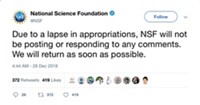Advertisement
Grab your lab coat. Let's get started
Welcome!
Welcome!
Create an account below to get 6 C&EN articles per month, receive newsletters and more - all free.
It seems this is your first time logging in online. Please enter the following information to continue.
As an ACS member you automatically get access to this site. All we need is few more details to create your reading experience.
Not you? Sign in with a different account.
Not you? Sign in with a different account.
ERROR 1
ERROR 1
ERROR 2
ERROR 2
ERROR 2
ERROR 2
ERROR 2
Password and Confirm password must match.
If you have an ACS member number, please enter it here so we can link this account to your membership. (optional)
ERROR 2
ACS values your privacy. By submitting your information, you are gaining access to C&EN and subscribing to our weekly newsletter. We use the information you provide to make your reading experience better, and we will never sell your data to third party members.
Policy
Lawmakers Question NSF Peer Review, Keep Helium Flowing
by Andrea Widener , Britt E. Erickson
December 23, 2013
| A version of this story appeared in
Volume 91, Issue 51
COVER STORY
Lawmakers Question NSF Peer Review, Keep Helium Flowing
Republicans on the House of Representatives Science, Space & Technology Committee, led by Chair Lamar S. Smith (R-Texas), twice put forward draft legislation that would add extra layers of approval to the National Science Foundation’s highly regarded merit review process. Many science organizations oppose such legislation, which was never formally introduced.
The proposal is part of draft legislation to reauthorize the America Competes Act, a 2007 law aimed at boosting U.S. competitiveness. The original law and its 2010 reauthorization proposed doubling funding for NSF, the National Institute of Standards & Technology, and the Department of Energy’s Office of Science.
The law expired in October. And although no one expects the budget-doubling goal to be part of the reauthorization legislation given the current budget environment, stakeholders are concerned that partisan provisions, such as changes to NSF’s merit review system, may be part of the package. Observers expect that the draft bills will be introduced in 2014.
One bill that was introduced in the House (H.R. 708) and Senate (S. 350) was the Fair Access to Science & Technology Research Act. This measure would require federal agencies that annually fund $100 million or more in scientific research to make the results of that research free within six months of publication. Neither congressional house has taken action on the legislation.
Congress did pass a last-minute deal to keep open the Federal Helium Reserve, a government facility that provides 42% of the nation’s helium supply. Helium users in academia and industry feared that the sudden closure would have thrown prices into disarray and caused shortages that could damage important research projects. Under the deal the facility will still close, but more gradually as its remaining helium supply is auctioned off over the next decade.
Lawmakers, however, didn’t complete work on one of the country’s largest challenges: immigration reform. Science and technology companies and universities want to make it easier for science, technology, engineering, and mathematics workers and students to come to the U.S. A bipartisan comprehensive immigration reform measure that passed the Senate (S. 744) expanded the number of temporary worker visas and created a merit-based immigration system that rewards education. But the bill hasn’t yet been taken up in the House.



Join the conversation
Contact the reporter
Submit a Letter to the Editor for publication
Engage with us on Twitter